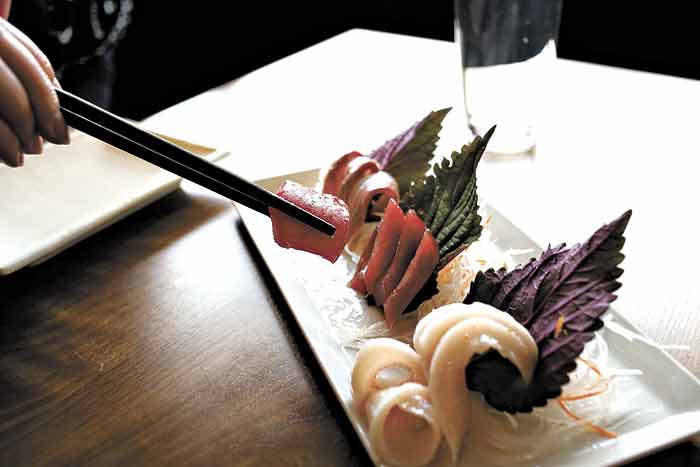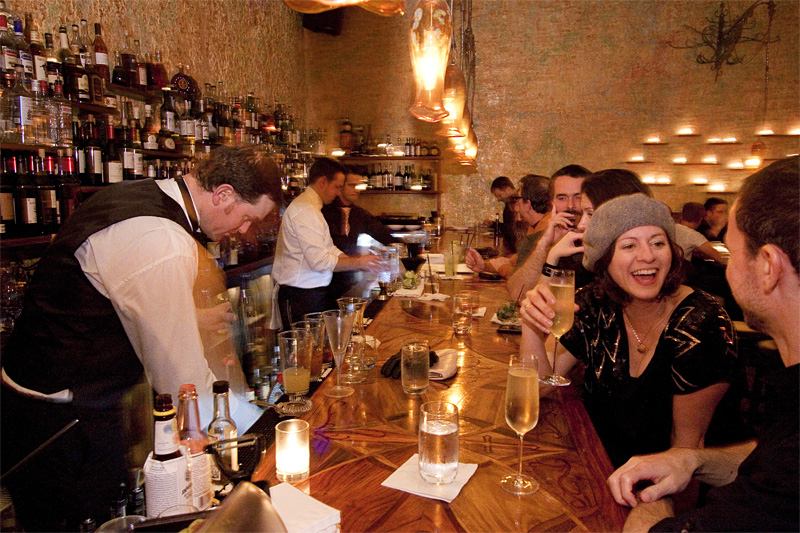You know those parents who, about the time that their first two kids are reading Harry Potter, get sloppy with the birth control and end up with child #3? Well, in a similarly inadvertent way, Eric and Sophie Banh, owners of Monsoon and the Baguette Box sandwich shops, have found themselves with an extra restaurant to love and feed.
It’s due more to an excess of caution than to negligence, however. More than a year ago, the brother-sister restaurateurs learned that the building housing their 10-year-old restaurant on 19th Avenue East was slated to be demolished—condos, natch. The developer who’d purchased the property couldn’t tell them precisely when they’d be evicted, but they felt as though they should start planning a move. Just as they began looking, the owner of Porcella on Main Street in Bellevue shut down his charcuterie-market, and they grabbed the lease. Then the economy tanked, the condo development was canceled, and as of December 2008 the Banhs found themselves the proud, and perhaps premature, owners of Monsoon East.
Given the surprise nature of their Quiverfull-worthy brood, I was planning to wait a few extra months for the owners to organize themselves before paying a visit. I gave them yet another after the Banhs announced they’d hired Johnny Zhu to run the kitchen. Zhu, an Alinea alum, held the same second-in-charge position at Veil, where he cooked a couple of dishes that lingered in my thoughts for months. Reading the news was like spotting a photo of a friend’s new manny on Facebook and discovering we’d flirted with each other at a party before. Visits were immediately scheduled. Casseroles were baked.
Their timing may seem awful, but from all the evidence, Banh et Banh couldn’t have picked a better place to open during the downturn. Here’s a tip for anyone who needs reassurance after reading a stack of this week’s Wall Street Journals: Drive to downtown Bellevue for Friday-night dinner but don’t make any reservations. By the time you find yourself at Z Tejas, settling for pint-size margaritas and chips after being turned away everywhere else, you’ll be relieved to be so infuriated.
The recession is nowhere to be found on Monsoon’s wine list either. To the contrary, everything’s at bull-market prices. There are only a few bottles in the $30 range—no wonder I only spotted one bottle around me—and the $10 glass of Muscadet I ordered sells for $7 or $8 at other pricey bistros around Seattle. It’s a shame, really, since for years Monsoon’s been doing great things with wine pairings, especially in scouting out lovely whites.
There’s definitely a high-end cast to the crowd, and the service seems poised to accommodate it. One waiter had that manner I can only describe as fulsome (everything I said was an “excellent choice, sir,” which always makes me feel like I should raise my hand in response so he can kiss my ring). He also had the vigilance to catch my glance before it turned into a craned neck. Even the more casual waiters shared his quick reflexes, and at one point, as we were about to pick up our spring rolls, Banh himself dashed over to deposit a tiny spoon in our dipping sauce.
The room accommodates Bellevue prestige as well. The former home of Porcella was stripped down to its poured-concrete floors and exposed-ductwork ceilings, then swaddled in gauzy curtains and teak-colored woods. Wine shelves and elaborately carved doors, imported from Vietnam, serve as gates to the creamily lit dining room, dispersing the flickering impression of being in the VIP lounge of a Belltown club. The old prepared-foods counter in front has become a bar with an icy display of raw seafood, the curing room filled with pork haunches replaced by an open line.
I was curious to see how Zhu would mesh his experimental haute-cuisine training with Eric Banh’s (comparatively) more classic Vietnamese style. The answer: He doesn’t. Monsoon East’s menu mostly replicates its older sister’s, including favorites like beef luc lac and drunken chicken.
What is new to Monsoon II is its exquisite Vietnamese sashimi. If the soy and wasabi served with Japanese sashimi bring out the fish’s buttery, meaty aspects, Banh’s version honors its sweetness. A trio of tunas—farmed kampachi, wild hamachi, and bigeye tuna, in varying shades of pearly pink—were fanned out against tia to (shiso) leaves, which we tore up to roll with the fish, spooning two sweet citrus sauces over them. Even finer is the coral-rimmed Kona kampachi, served on its own, with shrimp salt, sugared lime juice, and fine threads of rau ram, or Vietnamese cilantro.
But when it came to the cooked, I had two wildly differing experiences. On my first visit, the food swung between fantastic and awful. A salad of delicately fried squid with frisee, mango, and papaya was so murdered by magenta Sriracha-sauce dressing pooled around the plate that the dish deserved its own CSI case number. A plate of duck-breast slices stacked on mustard-green leaves with a thin betel-leaf puree was almost too fatty and leathery to gnaw through. I don’t care whether your technique is Chinese, Vietnamese, French, or Albanian, rendering the fat from duck while preserving its tenderness is Meat Prep 101 in any professional kitchen. Just as disturbing was the fact that the jasmine rice was mush. Had I been served a basket of Wonder Bread at Crush I would have been just as baffled.
I’m still not sure what to make of such a scattershot meal—new cooks? foul temper?—especially since the quality was back up when I returned for a second visit. Even the simple dishes were solid: Peavine tips stir-fried with shallots tasted like Demeter’s fecund return from the underworld, while a straightforwardly Chinese-influenced dish of flatiron steak was stir-fried with fine threads of ginger that sparkled in the mouth.
The beef, which tasted like tenderloin that had been transplanted for a few days to the cow’s more flavorful quarters, reminded me just how committed Banh has been to sourcing ingredients from the high end of the supply chain. Monterey squid, Carlton Farm pork—you can deride Monsoon as Tamarind Tree food at Dahlia Lounge prices. When the cooking’s off-kilter, I’d certainly rather be at Jackson and 12th. But when the kitchen’s on, as it was that night, the quality of the ingredients proved themselves.
Two dishes hammered home the point: First, the stir-fried sole, browned around the edges but still tender, in a sweet-tart broth with pickled red chiles and rice paddy herb—a countertenor of an herb whose high, clear note has the strangest appeal. Second, the stuffed baby squid, grill-browned and plump, sliced open to spill a mix of ground duck, black mushrooms, and Thai basil. Earth and ocean, floral and earthy, the dish resolved an array of incongruent flavors into a unique creation that showed both nature and nurture to good effect.
Price Check Kampachi sashimi $12 Duck-stuffed squid $9 Wokked peavines $12 Flatiron steak $18 Catfish claypot $15






